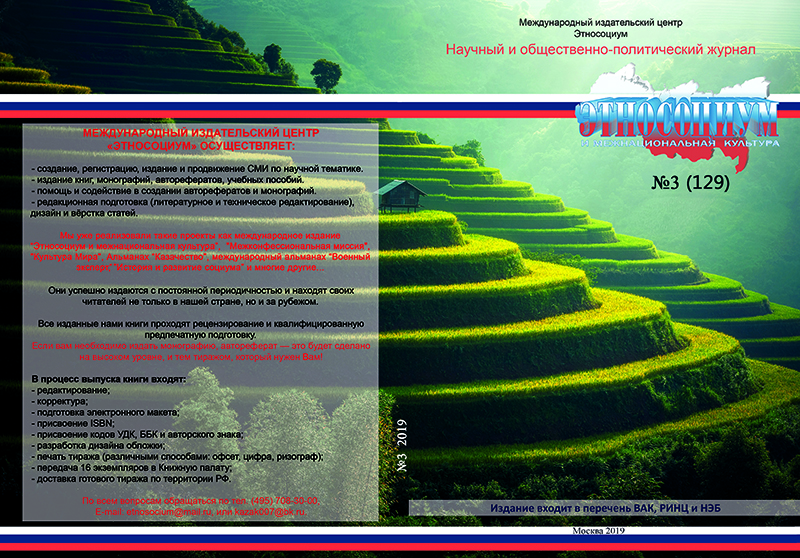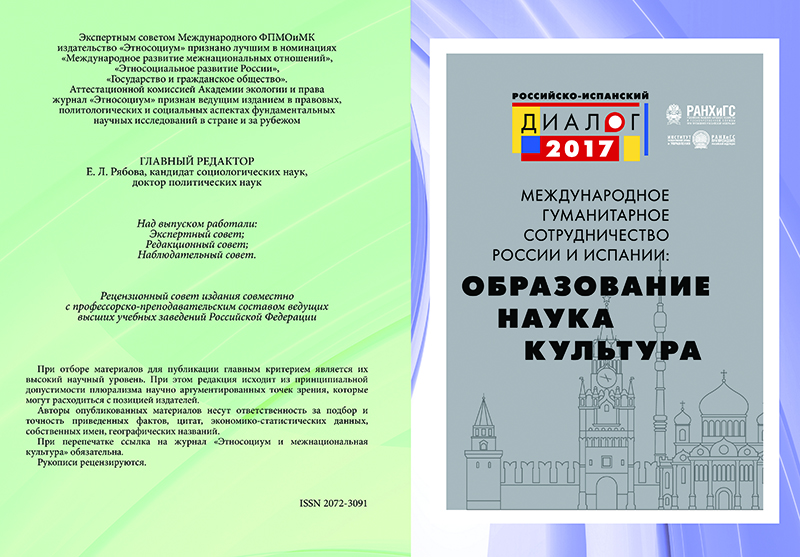

Content
|
COUNCIL OF INTERNATIONAL RELATIONSHIP
|
|
|
Suleimanova S.S., Ryabova E.L. Internet communications is a modern dialogue tool
|
9
|
|
Letunovsky P.V., Seledcova V.N. On spiritual and moral bonds in the Russian army: historical and political aspect
|
26
|
|
ACTUAL PROBLEMS OF MODERN SOCIETY:
POLITICS, ECONOMICS, LAW
|
|
|
Rodko O.A. The challengers of modern society: the problems of religious and secular ethics
|
34
|
|
Taganov M.V. Assessment of the impact of technological structures on the formation of the Russian economy
|
43
|
|
Tambi S.A. Captain from Estonian Island of Muhu: More than 50 Years of V.A. Vaga Service to Russian Marine
|
52
|
|
REGIONAL STUDY:
POLITICS, ECONOMICS, LAW
|
|
|
Zakirov A.P., Fazulov A.P. The forms of political participation of ethnic groups
|
72
|
|
Balzhinimaeva E.P., Tsyrempilova E.V. State bureaucracy: problems of reform, on the example of the Republic of Buryatia
|
85
|
|
Pelevin S.I., Denisova L.L. Theory of social and political development in Russia as a mechanism of social changes
|
91
|
|
Kondrashihina O.A. Deciding of problems with high shares of uncertainty: expression of heuristic effects of thinking
|
99
|
|
INTERNATIONAL RELATIONSHIPS:
POLITICS, ECONOMICS, LAW
|
|
|
Sochneva A.O. Evaluation of the Russian Federation policy in Central Asia by US experts
|
105
|
|
MARINE LAW
|
|
|
Ryabova E.I. Some aspects of protection of the labour rights of seafarers
|
118
|
|
Cao Jing Marine aspect of the Energy security policy of China: vulnerability and military modernization
|
126
|
|
Abstracts
|
137
|
|
Authors
|
147
|
|
Requirements to materials submitted to the international publishing house "Etnosocium"
|
151
|
The article shows that the Internet, acting as a means, method and form of building communicative interaction, defines new forms of interaction, brings a fundamentally new level of structuring of information and communication interaction.
The authors note that the information sphere has become a system-forming factor in public life and it can be reasonably argued that in the life of society it plays not a supporting role, but one of the key ones.
Keywords: internet, information, Internet technologies, communication, information society, communication interaction, phenomenon, media sphere.
The article analyzes the content of spiritual and moral foundations and norms of behavior of the Russian army in the period of hostilities in various historical eras.
Keywords: mentality, military rhetoric, Russian commanders, humanism, civilians.
In this article, the author examines the foundations of religious and secular ethics, based on three fundamental mental States of man: faith, fear and the desire to find solace in suffering. Their moral, practical and humanistic possibilities are analyzed.
Keywords: religious ethics, secular ethics, faith, fear, suffering, consolation, lack of spirituality, morality, existential frustration, moral laws, punishment, prayer.
The state of the Russian economy at the present stage is analyzed. The author considers "technological ways", which characterize the state of socio-economic development ofцеломthe country. In this regard, special attention is paid to the problem of Russia's transition to the sixth technological order, i.e. development of innovative production.
Keywords: technological structure, development of nanotechnologies, innovative production, development infrastructure, scientific research.
The article describes the life of the famous Far Eastern captain Vasily Vaga, an Estonian by nationality, who moved from the island of Muhu of the Livonia province in the eastern direction, to the Far East. The novelty of the work lies in the fact that up to the present moment none of the researchers has been engaged in a comprehensive and deep study of the biography of V.A. Vaga. The uniqueness of the study lies in the fact that the author has collected, systematized and presented in this paper the materials of the Estonian National Archive, as well as materials of newspapers in the Estonian and Russian languages, which are first introduced into the scientific circulation. The article tells about the ancestors of V.A. Vaga, his childhood years spent on the island of Muhu, relocation to the Far East, career successes of the young captain, awards received for participation in the operation to rescue Chelyuskinites in 1934, participation in the Great Patriotic War, and, finally, about the last years in Tallinn, his family and the perpetuation of memory about him in Soviet times and in the present days. In conclusion, the author states that the brave and experienced Far Eastern captain V.A. Vaga made a great contribution to the national marine. The main methods used in the study are the generalization method, the system approach, the historical descriptive method, the document analysis method and the empirical description method.
Keywords: Estonians, Vassily Vaga, captain, Muhu, Vladivostok, Far East, Chelyuskinites, history.
The article analyzes the forms of political participation of ethnic groups and their grouping. The cases of political participation in Scotland, Germany, Switzerland are considered.
Keywords: ethnic group, political participation, political participation of ethnic groups, ethnic party.
The article analyzes the stages of reforming the regional government, emphasizes that the basis of this process is the transformation of the state bureaucracy into an “open” model of the civil service. The author considers some problems of the implementation of administrative reform. It was noted that the effectiveness of the activities of the state bureaucracy depends largely on the developed civil society in the region.
Keywords: government bureaucracy, administrative reform, selection principles, number of civil servants.
The theory of socio-political development is trying to explain the qualitative changes in the structure of society, which help society better implement goals and objectives. Development can be defined in a way applicable to all nations in all historical periods, as an upward movement, demonstrating higher levels of energy, efficiency, quality, productivity, complexity, understanding, creativity, skill, pleasure and achievement.
Keywords: social development, changes, intensity, society, factors.
The paper presents the results of a pilot study of the features of solving problems with a high degree of uncertainty by students-psychologists. The frequency of heuristics of representativeness and the effect of the primacy in the sample is estimated. Describes the typical reasoning of students and the argumentation of answers.
Keywords: political science, psychology student, representativeness heuristics, primacy effect, problem, uncertainty.
Central Asia is an important region of the priorities of the foreign policy of the Russian Federation. American experts form a negative opinion about Russia with their publications, as most countries in the post-Soviet space listen to them. Mukhina Yana Borisovna and Komleva Valentina Vyacheslavovna spoke about this more than once in their articles. The purpose of this paper is to identify the peculiarities of assessments by American experts of Russian policy in the post-Soviet space. As a characteristic feature of modern research, we can note the tendency to consider the history of relations between Russia and the United States in the relationship of the whole process of the formation of new independent states, the transformation of interstate interaction as a whole. Criteria for the selection of these experts are the direction of their activities and competence in this matter, the novelty of publications. As a result, we can single out the main directions of Russia's policy in Central Asia, according to US experts: in the region there is support from Russia, as “buffer states”, and the use of soft power from Russia is observed. It can also be noted that Russians historically tend to view the post-Soviet space as a fundamentally Russian culture and history. Experts emphasize the region’s dependence on Russia in the energy sector. There are doubts that the Eurasian Economic Union is an international organization of economic integration. His goal, according to experts, is the subordination of the countries participating in the EAEU.
Keywords: geopolitics, soft power, central Asia, eaeu.
The article deals with the issues related to the labor rights of seafarers of civil navigation vessels. A brief review of the main international documents regulating the work of seafarers and ensuring the observance of their rights in the process of exercising their official functions is carried out. The issues of gender inequality and the protection of the rights of women seafarers were highlighted.
Keywords: labor law, seafarers, commercial fleet, working conditions, legislation.
The aim of the given article is to present the China's view on the problem of providing energy security, especially in the light of the growing disputes and various issues that may grow big enough to obstruct the vital transportation artery – namely marine transportation of oil products. This is especially important for China given the fact that its economy is extremely dependent on the stability of the oil supply through sea transportation lanes. This article is mostly based on Chinese sources and some sources English when the material in Chinese was hard to find. The article is divided into two parts. First the author presents the Chinese perspective on the problem of energy security and shows that Chinese leading experts in the field of sea policy are aware of the China’s vulnerability in that regard. The author goes on with presenting the measures the Chinese government had adopted in the recent years focusing on the development of some aspects of the Chinese Navy suitable for overseas operation as well as the protection of the South China Sea. The author concludes that even though there are more than one driving force in China’s recent efforts to modernize its Navy, the energy security is undoubtfully the main one.
Keywords: energy security, Chinese People's Liberation Army Support Base in Djibouti, PRC, sea transportation, South China Sea, «the Malacca dilemma».